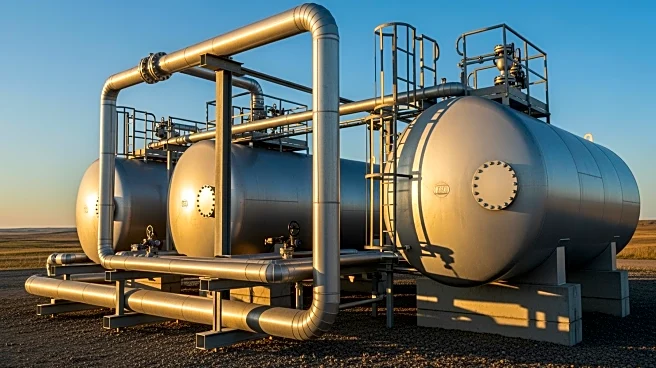What's Happening?
President Trump has announced a new tariff policy targeting the pharmaceutical industry, imposing a 100% duty on patented drugs unless the manufacturers are actively building production facilities in the United States. This policy, set to take effect on October 1, 2025, is part of a broader strategy to encourage domestic manufacturing and reduce reliance on foreign imports. The announcement also includes tariffs on other imports such as heavy trucks, kitchen cabinets, and upholstered furniture. The move is expected to impact major drugmakers like Merck & Co., AstraZeneca PLC, and Johnson & Johnson, who have already announced significant investments in U.S. manufacturing. The tariffs are being implemented under Section 232 of the Trade Expansion Act, which allows for tariffs without congressional approval if imports are deemed a national security threat.
Why It's Important?
The imposition of tariffs on patented drugs is a significant development in U.S. trade policy, aiming to bolster domestic manufacturing and reduce dependency on foreign pharmaceutical production. This could lead to increased investment in U.S. manufacturing facilities, potentially creating jobs and boosting the economy. However, it also poses challenges for multinational drug companies that rely on overseas production, potentially increasing costs for consumers and affecting drug availability. Countries like Singapore and Switzerland, which are major exporters of pharmaceuticals to the U.S., may face economic repercussions. The policy reflects President Trump's broader trade strategy, which has included tariffs on various industries to protect national security and promote domestic growth.
What's Next?
As the tariffs take effect, pharmaceutical companies will need to assess their production strategies and potentially accelerate plans to establish or expand U.S. manufacturing facilities. The Trump administration is also expected to introduce additional tariffs on critical imports such as semiconductors and critical minerals, further impacting international trade dynamics. The administration's focus on reducing reliance on foreign manufacturing could lead to more stringent trade policies and negotiations with affected countries. Stakeholders, including drug manufacturers and international trade partners, will likely engage in discussions to mitigate the impact of these tariffs and explore exemptions or adjustments.
Beyond the Headlines
The tariff policy raises ethical and legal questions about the balance between national security and global trade relations. It may prompt debates on the effectiveness of tariffs as a tool for economic growth and the potential for retaliatory measures from affected countries. The policy could also influence long-term shifts in the pharmaceutical industry, encouraging innovation and investment in domestic production capabilities. Additionally, the focus on national security as a justification for tariffs may lead to broader implications for U.S. trade policy and international relations.










